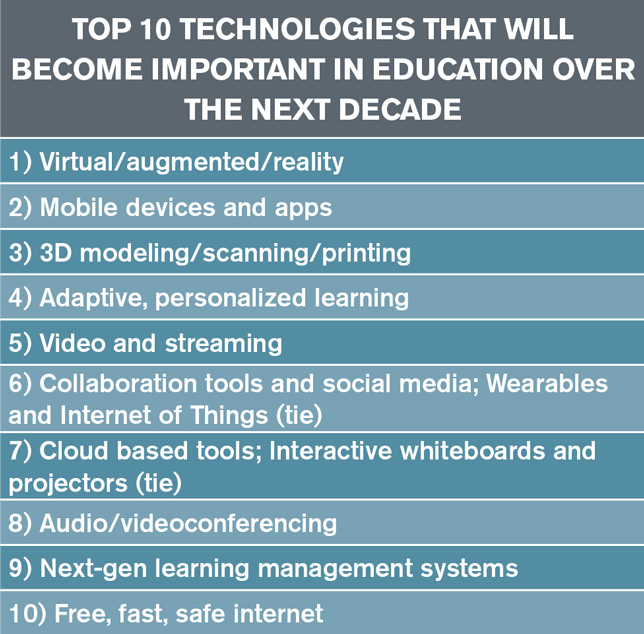Faculty Predict Virtual/Augmented/Mixed Reality Will Be Key to Ed Tech in 10 Years
Faculty in our 2017 Teaching with Technology Survey believe tech will play a positive role in the future of higher education — but some technologies will be more important than others.
Judging by the outlook of faculty in colleges and universities today, the future is bright for technology in higher education. A full 98 percent of faculty members who took Campus Technology's second annual Teaching With Technology Survey believe technology will play a positive role in education going forward. That's a step up from 97 percent who answered the same in 2016.
What technologies do faculty think will be important in education over the next decade? The most popular answer to that question by far was virtual/augmented/mixed reality, garnering 81 percent of responses (it topped the list last year as well). Mobile devices and apps, 3D modeling/scanning/printing, adaptive/personalized learning and video/streaming all rounded out the top five.
A few of the less common answers that caught our eye: access to technology only by the affluent, neural embeds, "some are not invented yet" and live 3D instruction (we assume that last one is tongue-firmly-in-cheek).

Of course, not all technologies have such a rosy future. When asked to predict what technologies would be dead and gone in the next decade, 15 percent of respondents pointed to desktop computers and laptops, while 12 percent called out clickers. (Those two categories, by the way, have presumably been dying since they topped the list in our 2016 survey.) A slough of others received single-digit mention.
A few of the less frequently cited but more interesting candidates for the death list: traditional classrooms, coding, flipped classes, low-cost education and unregulated internet.
When we asked faculty which technologies they wish they didn't have to deal with, their top choice was learning management systems, receiving 12 percent of the vote. Close behind was mobile devices (including smart watches), cited by 10 percent of respondents.
Other answers that raised our eyebrows: anything free and unsupported, Google, cheating/"tutoring" sites, surveys by students, cart-based anything, tech people and non-tech faculty. (Can you really have those last two both ways?)
Faculty also provided freeform comments on the state of technology in education, which left us with plenty of food for thought. Our favorite closing words:
"Tech in education is here and always will be, but the way we teach its use must remain flexible," said one respondent from a Massachusetts college.
"Technology is here to stay," agreed a respondent from a two-year college in Georgia. "It is changing so rapidly. But, that is a good thing. That means it is trying to get better and better all the time."
"Technology integration needs to become seamless for adoption to continue to thrive," commented a university faculty member in Florida.
"Technology facilitates education, but education happens with or without it!" asserted a respondent in Texas.
"The biggest changes to affect education with regard to technology will come in the form of new software applications that are emerging and do not currently exist," said a respondent from an Alabama community college.
And one faculty member in Pennsylvania put it simply: "Excited for the future!"
The full results of the Teaching with Technology Survey appear in the July digital issue of Campus Technology. You can also find past coverage in our Research section.
About the Author
Rhea Kelly is editor in chief for Campus Technology, THE Journal, and Spaces4Learning. She can be reached at [email protected].